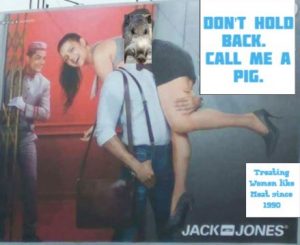Welcome to UBC Blogs. This is your first post. Edit or delete it, then start blogging!
-
Recent Posts
Recent Comments
Archives
Categories
Welcome to UBC Blogs. This is your first post. Edit or delete it, then start blogging!

[Image Source: https://www.mid-day.com/photos/oops-these-controversial-ads-landed-bollywood-stars-in-big-trouble/8917]
The above billboard ad features Bollywood star Ranveer Singh in an ad for Danish fashion brand Jack & Jones. Just as India is a male-dominant social culture, the advertising industry is also highly male-dominated. The ad features a well-dressed man carrying his female co-worker home with him and the facial expressions of the two men (and woman) make it obvious he plans to have sex with his woman co-worker. Thus, the billboard’s image demonstrates the predominance of heternormativity in mass media advertising, especially in a conservative culture like India’s. This ad is blatantly sexist in the way Singh is carrying the woman on his shoulder like she is a piece of meat to be carried to his apartment. Their relative physical position demonstrates the uneven power relations as the woman co-worker is presented as a possession or prize in some sexualized office contest which he has won and is now taking home to ravish sexually. The leering doorman obviously approves of the man’s sexual conquest. Gender inequality, unfair power relations, heteronormativity, and social class divisions (which is highly important in Indian society) are a few of the intersectionalities of oppression women in India face.
Moreover, while Singh’s own body is fully covered, the woman’s mini-skirt barely covers her bottom and her position highlights her bare legs. Besides Singh’s face, drivers only see one bare forearm and two hands. In contrast, over fifty percent of the woman’s body is left bare and all that bare skin is a way to distract and attract the attention of passing male drivers. Both the man and woman are light coloured, so postcolonial whiteness may explain why they were chosen for this ad since India is a former British colony. Marketers have long known that “sex sells” and “whiteness sells” so this ad attempts to take advantage of these old marketing truisms.
Even the ad’s punch line, “Don’t hold back. Take your work home.” is highly sexually suggestive and quite offensive to women. This ad clearly suggests that men who wear Jack & Jones’ dress shirts will attract the ladies and make them helpless to resist their sexual advances. The sexist punch line suggests female coworkers will abandon their personal inhibitions at the sight of a male coworker in J&J dress shirts. If this actually happened, nobody would take her seriously at work the next day, ruining her future career with this company. This type of sexist attitude demeans women and presents women as being less intelligent, unprofessional, and too easily manipulated by what a man wears

[Image source: The Conversation]
JAMMING PHILOSOPHY
The original advertisement features a handsome male actor in a dominant power position over the helpless woman. My jammed version of the ad replaces his “handsome” physical face and replaces it with his “hidden” character, that of a boar or male pig. He views women as pieces of meat to be “taken home” for his sexual pleasure, so I am removing his suave, attractive mask to reveal his inner pig. Since he treats women like pieces of meat, the new cultural mashup ad transforms him into a well-dressed piece of pork. Also, the original ad’s heteronormative depiction of “normal” relations between a man and woman is now transformed into a non-normative relationship as a result of the man’s transformation into an animal.
Moreover, actor’s postcolonial whiteness from the original ad is now replaced with the face of a black pig. In many Asian countries, whiteness is associated with the upper class and higher social standing due to their past histories as European colonies. Whiteness symbolizes the white cultural norms of their past white overlords and colonial masters. Even after achieving political independence from white European occupiers, the continued desire to have fair or white skin is a common colonial legacy. Even today, men and women with lighter skin colours are generally considered more attractive in these ex-European colonies. In contrast, blackness or dark skin is associated with the lowest class of labourers and native peoples, many of whom work under the hot sun. For this reason, I chose the head of a “black” bearded boar specifically to transform his whiteness to blackness.
As for the textual change, instead of reading “Sharp Office Shirts”, the ad now reads “Treating Women like Meat Since 1990”. 1990 is the year Jack & Jones was founded. These types of sexist ads disempower and disrespects women by treating women like meat. The woman is there mainly for the man’s heteronormative entertainment or sexual pleasure. She is not admired or respected for her intelligence or abilities. She is purely “eye-candy” that he finds attractive and will take home, supposedly aided by his wearing a J&J dress shirt. The absurd or injurious social message I am attacking is patriarchal attitude that men have the right to treat women like sexual conquests and women only exist to pleasure men sexually. Even if she is attracted to the man, carrying her off like a sack of potatoes humiliates the woman and greatly damages her professional reputation.
These ads reveal how women suffer from multiple and intersecting oppressive systems in their daily lives. These types of ads fail to acknowledge the fact women are intelligent, capable, hard-working, and independent or the possibility that women may not be heteronormal. Furthermore, in reality, any man who attempts to throw his female co-worker over his shoulder to take her home for sex should be arrested for sexual assault or at least sexual harassment.